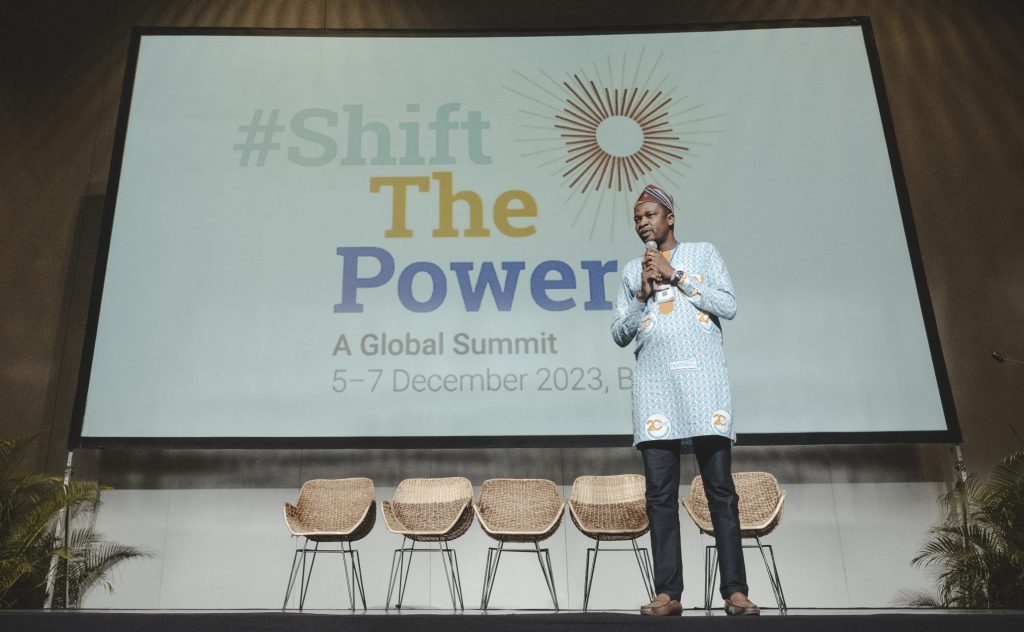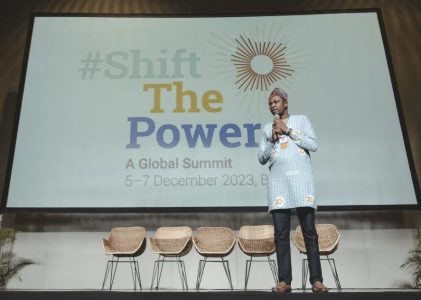

In the first week of December 2023 a glorious event happened. The #ShiftThePower Global Summit brought together over 700 individuals from 70 countries to have a joint experience. It wasn’t a conference, it was more akin to an “unconference.” Hoping to emulate what the movement is aiming to do, the Summit went against the “rules” of a conference, it did away with structure and formalities, and opted, instead for space to share and weave ideas, for challenge as well as agreement, for conversation, for healing and for much needed joy.
There were speeches at the start of each of the three days, followed by open sessions where people could convene on topics such as moving beyond logos, egos, siloes and halos, measurement as political, joyful ones like “what’s the point in revolution if we can’t dance?” and identifying ways of “building our collective dreams.” They all allowed space to reimagine our own systems. Throughout the conference there were rest rooms with sleep pods available – for those travelling long distance, and sessions for well-being, where people could let go and just be present, as a recognition of the difficult and, at times, traumatic effects working in development can have, especially right now.
The convenors of the #ShiftThePower movement and the Summit, the GFCF, did a wonderful job, as they brought in Colombia for all of the senses. There were stalls which shared with participants the spirit of Colombia, from authentic Colombian coffee and chocolate to try and buy, tasting of local fruits and juices, and wristbands and bags locally sourced and created from Colombian communities.
In addition, all sessions were delivered in English and Spanish. It felt like a truly immersive experience, which allowed for all to learn more about the place we were in, and the importance of local communities, the history and struggles that had happened. The lunch food was sourced locally, and I had the pleasure of meeting some of the local youth volunteers who took time to explain the ingredients that went into each dish.

We heard from incredible community speakers from around the globe. Many of the speeches I heard really resonated with me.
Marta Ruiz, a journalist and former Truth Commissioner in Colombia, reflected on the work of the Commission, reminding us that it was not the politicians or military who drove reconciliation in Colombia, rather it was the victims. Even after all they had been through, the energy for driving forward change, came from the communities, not from within the existing societal structures.
Marta left us with a stark reminder that, in order to change our future, we need to aim for structural change, which will require a change of mindset. She also touched upon a theme that came up in many conversations – that there is a very real need for acknowledgement of our shared colonial past; what we have inherited and the legacies which endure. We need to acknowledge these historical, colonial legacies and the harms they have caused which we still live with today through poverty and racial hierarchies.
Truth is a necessary value, because truth gives us back our trust.
Marie-Rose Romain-Murphy of Economic Stimulus Projects for Work and Action / Haiti Community Foundation, shared a powerful message, stating that we need to recognize “hope as a strategy.” It’s not a “nice to have”, it’s necessary whilst doing hard work.
Her talk spoke about how we as a global community will not be able to shift power if we continue to play the game. Instead, we need to break the rules, we need to find opportunities, space and moments to disrupt “business as usual.” Going along with the current status quo has meant that marginalized communities in countries around the world have become marginalized from their own development. Marie-Rose also shared that, in order to shift power, we need to name the intersections of identities that affect marginalized communities, and not forget about the diaspora in the sector. To do this would mean shifting power across race, gender, class and more.
Hope is not giving up, it is persisting, it is continuing with the training, the difficult conversations, the raising of challenges in our organizations and institutions and spaces, because this is necessary.
Hope is a strategy. Persistence is power.
Hope is a space where stakeholders, from funders, civil society organization (CSOs) and communities, come together to take on the challenges that face us all. In the end the only thing that will save us is working together through a spirit of solidarity, rooted in truth, while acknowledging the past and working across what divides us towards a shared future.
Those who hold power have the maximum responsibility to do better.
From the many conversations I had with colleagues from the North, and from meeting new friends from local communities, there was a consensus that the challenge of shifting power is an immense one. Dismantling the existing institutional imbalance of power will need us all to get involved. The current system creates artificial barriers between communities and movements in the North and South, and we all have a role to play in changing that.

What the Summit highlighted, was the pockets of change that were being moved forward by different actors. Taken collectively, these can lead to ways to work in solidarity together. Whilst institutions are starting to have the conversations on decolonization, #ShiftThePower and localization, movements across the world are looking at ways of standing in their power to create new ways of receiving funding and having funder conversations, to get resources their communities need and to build trust. They are also creating spaces to continue these challenging and joyful conversations.
Recognizing that no single person has capacity to take on the whole system, incremental change in multiple different places can be powerful. Sharing what change is happening through Summits like this one can provide the much needed bouts of momentum that will keep this movement going and going and going.
When the veil is lifted, and we understand the power dynamics happening in front of us, we cannot hide from the injustices and disparities that we see, and the onus comes on us as individuals to raise these issues and co-create spaces and ways for us to change our organizations. Through this, we will hopefully influence the whole sector and, eventually, society as a whole. It’ll take us working on an individual, one-to-one basis to start moving forward, and in this way, perhaps we’ll inspire and challenge others to do the same.
The Summit did not result in a set of actions or next steps – but then that’s not what the Summit was aiming to do. Rather, we were all stimulated to think of what could be possible, and it pushed us to think outside of the box by connecting us and having conversations. I remember changing the system and shifting power was referred to as “flying a plane and trying to fix it at the same time.” It’ll take all of us, outside of the sector and within institutions and organizations, to create change. First in our own sphere of influence, in our areas of work, and then to take it up a gear and spark change within our organizations, changing the way we work outwardly and inwardly.
As with the nature of change, we won’t get to a moment where everyone is doing the same work, some will be moving slower than others, and others will be moving miles ahead with making radical transformation. All of these speeds are necessary as we move to a future which is more equitable and just, which I think we can all agree we need.
I left with a reaffirmed openness to emergent strategies and ways of doing and deciding what we do. Of finding ways to support and share and cede power, and a challenge to continually create the space of finding different and new ways of doing development which inspire and are joyful.
Lena Bheeroo is the Engagement and Equity Manager at Bond
